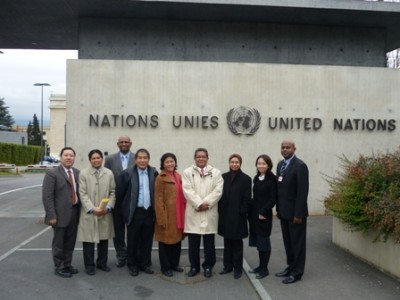The Second Session of the United Nations Forum on Minorities promised to be an exciting 2 day event, with a frank exchange of views by members of minority communities from around the world aiming to formulate a set of recommendations on the thematic topic this year: Minorities and effective political participation. Andrew Khoo, Chair of the Human Rights Committee of the Malaysian Bar Council and I, as Legal Adviser to the Malaysian Consultative Council for Buddhism, Christianity, Hinduism, Sikhism & Taoism (“MCCBCHST”), arrived at Geneva on Wednesday, 11th November 2009 courtesy of an international NGO called Minority Rights Group. By the way, their website has an interesting round up of the Forum – scroll down to see my quotable quote;)
Background
The Forum is established “pursuant to Human Rights Council resolution 6/15 of 28 September 2007…to provide a platform for promoting dialogue and cooperation on issues pertaining to national or ethnic, religious and linguistic minorities, which shall provide thematic contributions and expertise to the work of the independent expert on minority issues.” The Forum “shall identify and analyze best practices, challenges, opportunities and initiatives for the further implementation of the Minorities Declaration.”
In the draft Recommendations prepared by the Independent Expert, this concise description of who minorities are was set out as a guide to the discussion:
“The definition of ‘minorities’ focuses on persons who are (a) distinct from the larger societies in which they live, based on race, ethnicity, religion, their mother tongue or cultural practices, and (b) who, as a group, are non-dominant or disadvantaged in terms of their power relations with the majority population. The term ‘minority’ does not require an exacting assessment of relative population numbers.”
The format of the Forum was very structured – certain experts had been invited to give 5 minute presentations on a wide range of issues dealing with the thematic focus of enhancing the effective participation of minorities in politics. The remaining participants were then given 3 minutes to make “oral interventions” pertinent to the topic and intended to be solution driven. Those interventions were encouraged to be in written form and submitted beforehand, for ease of translation.

Member countries of the UN also sent delegations.
Malaysia sent some civil servants from the Department of Unity and the Home Ministry as well as some of its staff from its diplomatic mission to the UN based in Geneva.
Former MP Mutang Tagal and Universiti Sains Malaysia political analyst Associate Professor Dr Sivamurugan Pandian completed the government delegation.
Another prominent Malaysian at the forum was Ms. Jannie Lasimbang, one of the UN’s Independent Experts on Indigenous Peoples.
The Forum
The Forum was full of very informative and sometimes entertaining presentations. Yet, somehow, it seemed to me that much of it was purely the normal “set piece theatre” for which the UN is notorious. The format of the Forum, where pre-selected people present on certain topics, followed by oral interventions by the participants (which are scripted beforehand) do not really allow for a free flow and exchange of ideas which are normally associated with forums. Instead, everyone just presented their views with no real or meaningful interaction to the other views previously expressed.
This was in stark contrast to the Workshop for Minority Political Actors held on the day before the Forum. The open mike session during this Workshop, without the usual time restriction on comments, gave an opportunity for us to voice our opinions freely. I was able to speak, and briefly mentioned the need for the Judiciary to be recognised as an integral part of the political process and how the Recommendations of the Forum ought to include measures to improve the participation of minorities in the Judiciary. This laid the groundwork in order for the Joint Oral Intervention that Andrew and I made on the final day of the Forum on how the Judiciary must also see some reforms in order to achieve the effective participation of minorities in the political process.
Next: the oral interventions
